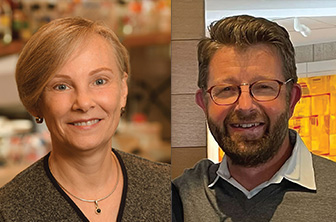Alzheimer's Disease Big Data to Biology Training Program (ADBDB-TP)

Todd E. Golde, MD, PhD (Pharmacology and Chemical Biology and Neurology) and David Weinshenker, PhD (Human Genetics) are MPIs in a new T32 training grant, "AD Big Data to Biology Training Program (ADBDB-TP)".
The training program, Alzheimer's Disease Big Data to Biology Training Program (ADBDB-TP), seeks to recruit and rigorously train highly qualified and motivated postdoctoral fellows (MD, MD/PhD and PhD) and predoctoral candidates in big data” science associated with ADRDs. The training will bidirectionally provide i) big data-focused trainees with more biological insight into ADRDs and ii) more neurobiologically-focused trainees with the ability to access, understand and analyze, and use big data sets.
Biological Discovery through Chemical Innovation Training Program at Emory University

A new program from the Biological Discovery through Chemical Innovation (BCDI) initiative is taking a highly interdisciplinary approach to train the next generation of drug discovery scientists. Funded by a T32 Institutional Training Grant from the National Institutes of Health, BDCI training program will provide graduate student trainees with the knowledge, language, and operational, technical, and professional skills needed to tackle the most pressing challenges in therapeutic discovery and development to prepare them for successful careers in the biomedical workforce.
The grant’s co-directors, Ellen Hess, professor of pharmacology and chemical biology, and Simon Blakey, professor of chemistry, are the principal investigators (PIs) for the program.
Graduate Training in the Pharmacological Sciences

Randy A. Hall, PhD, Professor of Pharmacology and Chemical Biology, Emory School of Medicine, has recieved a training grant, "Graduate Training in the Pharmacological Sciences," to support the training of 8 graduate students per year in an interdisciplinary Pharmacological Sciences graduate program. Fifty-four training faculty from 16 departments provide a wealth of diverse research training opportunities for students. The goal is to produce broadly trained scientists who will contribute to the biomedical workforce, especially to the discovery, development and regulation of novel therapeutic agents that will improve healthcare in the United States and worldwide.
Project Summary: Modern drug discovery and development require the training of scientists who understand the molecular, physiological and quantitative basis of drug action and specificity, and who can apply modern technologies and concepts to the development of novel therapeutic strategies. This multidisciplinary doctoral training program in the Pharmacological Sciences is designed to help meet that demand by preparing students for biomedical research careers in schools of medicine, dentistry and pharmacy, in research institutes, and in governmental or industrial laboratories. The most important component of training is laboratory research, first as a series of research rotations, then in the dissertation laboratory. This training is complemented by core courses in pharmacology that emphasize quantitative analysis of drug action, pharmacokinetics, drug disposition, biostatistics and experimental design, in addition to ethics training, seminar courses, journal clubs, and advanced courses in specialty areas. Emphasis throughout is placed on training in rigor and reproducibility, professional development, research ethics, and the refinement of communication skills. The 54 training faculty members represent 16 basic science and clinical departments at Emory, thereby providing a wealth of diverse research training opportunities. We plan to continue our track record of training success while also introducing new and innovative aspects to the training together with evidence-based mechanisms to evaluate both student and program outcomes. We are requesting 8 positions, with the typical duration

